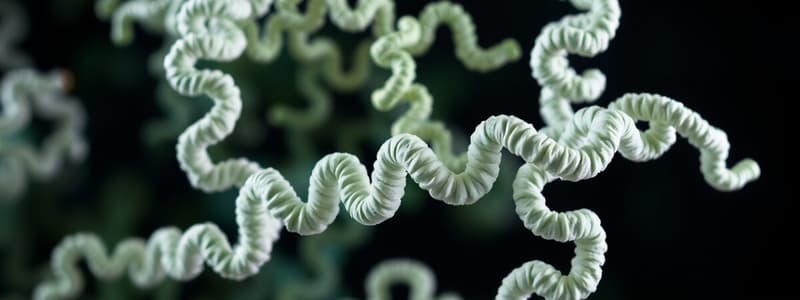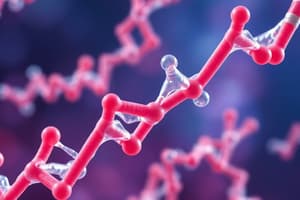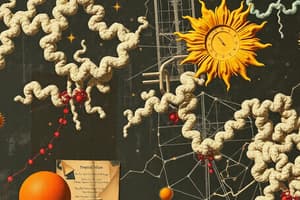Podcast
Questions and Answers
Which of the following is NOT a role of proteins in living systems?
Which of the following is NOT a role of proteins in living systems?
- Acting as enzymes
- Storing genetic information (correct)
- Transporting oxygen
- Providing structural support
Immunoglobulins are proteins responsible for muscle contraction.
Immunoglobulins are proteins responsible for muscle contraction.
False (B)
What is the function of storage proteins in the body?
What is the function of storage proteins in the body?
To bind with specific substances and store them.
Proteins exerting ________ pressure help maintain electrolyte and water balance in the body.
Proteins exerting ________ pressure help maintain electrolyte and water balance in the body.
Match the following types of proteins with their functions:
Match the following types of proteins with their functions:
Flashcards
Structural proteins
Structural proteins
Proteins form the framework of the cell's internal structure, providing shape and support.
Enzymes
Enzymes
Enzymes are protein catalysts that speed up biochemical reactions in the body.
Immunoglobulins
Immunoglobulins
Immunoglobulins are proteins that act as the body's first line of defense against infections.
Hormones
Hormones
Signup and view all the flashcards
Contractile proteins
Contractile proteins
Signup and view all the flashcards
Study Notes
Protein Structure and Function
- Proteins are fundamental structural components of the cytoskeleton.
- Proteins serve as enzymes, crucial biochemical catalysts.
- Immunoglobulins are proteins that act as a primary defense against pathogens like bacteria and viruses.
- Many hormones are composed of proteins.
- Actin and myosin, examples of structural proteins, enable muscle fiber contraction and movement.
- Some proteins act as receptors found in cellular membranes, cytoplasm, and nucleus.
- Transport proteins facilitate the movement of specific substances across membranes or within bodily fluids.
- Storage proteins bind and store specific substances like iron (stored as ferritin).
- Respiratory pigments like cytochromes, hemoglobin, and myoglobin, as well as components of the electron transport chain, are protein-based.
- Proteins can be broken down for energy production under certain conditions.
- Proteins play a role in maintaining electrolyte and water balance by contributing to osmotic pressure.
Studying That Suits You
Use AI to generate personalized quizzes and flashcards to suit your learning preferences.





